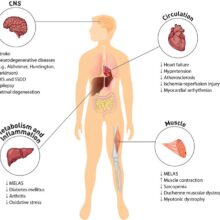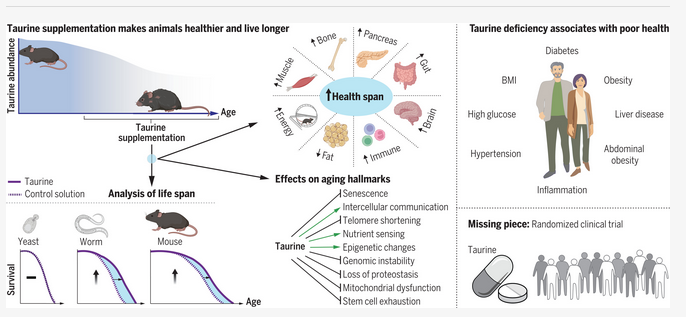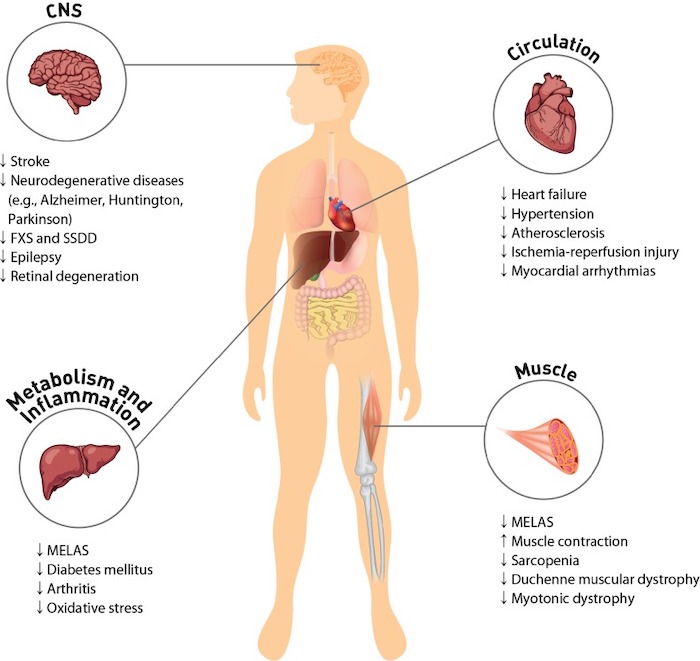Does Taurine Depletion Accelerate Aging?

Taurine depletion happens as we age. And with that come unwanted health consequences, perhaps even a decline in healthspan. This has been proven in various animal studies and is thought to be the same for us. Learn what to do about it.
Click here for image description
High concentrations of taurine in most cells regulate physiological function of excitable tissues and mitochondria. Taurine protects CNS by decreasing ER stress and antagonizing neurotransmitter receptors of GABAA, glycine and NMDA. Protection of the cardiovascular system by taurine occurs through regulation of cell signaling, such as Ca2+ transport, ROS generation and protein phosphorylation. Supplementation of taurine ameliorates symptoms of MELAS and diabetes mellitus. The anti-inflammatory activity of taurine involves either the formation of taurochloramine in neutrophils or the attenuation of nitric oxide and prostaglandin E2 in inflammatory diseases, such as rheumatoid arthritis and osteoarthritis. Taurine depletion or taurine transporter KO leads to cardiac and skeletal muscle dysfunction. Taurine prevents sarcopenia in aged person by minimizing gradual muscle loss. CNS: central nervous system; FXS: fragile X syndrome; SSDD: succinic semialdehyde dehydrogenase deficiency; MELAS: mitochondrial encephalomyopathy, lactic acidosis, and stroke-like episodes. For more, go here.
Yes, taurine depletion does accelerate aging in several animals studied, and in us.
Taurine is an amino acid that is naturally found in the human body, particularly in high concentrations in the brain, heart and muscles. It plays various roles in physiological processes, such as regulating osmotic balance, modulating neurotransmission, and supporting cardiovascular health.
Taurine has been in the news of late subsequent to a study published on June 9, 2023 in Science entitled, Taurine deficiency as a driver of aging. It was an eye-opener, because it found that:
Taurine abundance decreases during aging. A reversal of this decline through taurine supplementation increases health span and life span in mice and worms and health span in monkeys. This identifies taurine deficiency as a driver of aging in these species.
OK, we humans are kinda monkey-like, and taurine levels in our cells and tissues decline as we age, just like with monkeys and other critters, so should we be supplementing with taurine?
Let’s find out.
What do the Taurine Depletion Studies Say

Taurine deficiency as a driver of aging.
Taurine concentration in blood declines with aging (top left). A reversal of this drop through taurine supplementation increased healthy life span in mice and worms but not in yeast (bottom left and top middle). Taurine supplementation affected several hallmarks of aging (middle). In humans, lower taurine concentrations were associated with multiple diseases (top right). A randomized controlled clinical trial in humans is warranted to assess the antiaging effects of taurine (bottom right). BMI, body mass index.
As mentioned, taurine is an amino acid. We need 20 to function: 11 are made by our body and nine most come from food (they’re referred to as “essential” amino acids, because they cannot be made by the body.)
Taurine is not an essential amino acid; our body makes it, but it makes less and less of it as we age. And the amount we typically get from food or by supplementation is not enough to make up for the loss. Food sources include meat and fish. Vegetarians and vegans don’t get much, unless they supplement with taurine.
Recent studies that have examined taurine depletion and reversed it with supplementation suggest that taurine may have anti-aging properties and could promote longevity and healthspan.
The Science study mentioned earlier was done by Columbia University researchers. They found that taurine deficiency drives aging, and taurine supplements can improve health and lifespan in several species, including mice, monkeys, and humans.
The study’s leader, Vijay Yadav, PhD, stated that:
These studies in several species show that taurine abundance declines with age and the reversal of this decline makes the animals live longer and healthier lives. At the end of the day, the findings should be relevant to humans.
The researchers found that taurine supplementation improved various health parameters in mice and suppressed age-associated weight gain in female mice, even in “menopausal” mice. In monkeys, taurine supplements were associated with less weight gain, better blood sugar levels, less liver damage, increased bone density, a younger-looking immune system, and improved healthspan, reports CNN.
While the findings of these studies are promising, it’s important to note that they are mostly based on animal studies (with a notable exception I’ll mention in a bit), and it is not yet known if taurine supplements will increase longevity or improve the health of humans over the long run. However, Lauri Wright, PhD, a researcher in the field, said that taurine’s effect on the human body is an area of interest, and it’s likely that more studies into the compound will occur [1].
The study also explored the relationship between taurine levels and approximately 50 health parameters in 12,000 European adults aged 60 and over (the notable exception) and found that people with higher taurine levels were healthier, with lower incidence of type 2 diabetes, obesity, hypertension, and levels of inflammation [2].
Taurine has also been found to be effective in the treatment of metabolic diseases, such as diabetes, and inflammatory diseases, such as arthritis. There is reason to believe that taurine might prolong the lifespan of heart failure patients because it elevates high energy phosphate content of the heart, which is an important determinant of mortality among patients suffering from congestive heart failure [3].
Taurine might also improve mitochondrial function. On a metabolic level, taurine seems to improve the health of mitochondria, the body’s cellular powerhouse which creates “90% of the energy you need to sustain life and support organ function,” according to the United Mitochondrial Disease Foundation [4].
What Taurine Dose May Improve Human Healthspan?
Generally speaking, we should strive to get the “minimum effective dose” of any particular supplement so that we don’t overdo it and potentially run into side effects. In my google search, I found no side effects reported for taurine supplementation up to 3 grams per day; however, that dose is below the human-equivalent dose based on animal studies.
Based on the animal studies, people would need to take about 6 grams of taurine daily to achieve the same effects seen in mice and monkeys. That’s too much.
Lower doses of taurine may be beneficial and are well tolerated by humans. The most common doses of taurine are between 500 and 2000 mg per day, and studies show that higher doses of 3 grams per day for shorter time intervals will also provide health benefits and are well tolerated [1] [5] [6] [7].
There is no specific time interval to take taurine supplements, but it is recommended to divide the daily amount of taurine into two equal doses and take them on an empty stomach. When using higher amounts, take them three times per day. After 4 hours, only about 50% of taurine remains, which is why it is better to take it in divided doses about 4 to 5 hours apart.
The Confounding Effects of β-alanine
As you’ve been reading, we produce less and less taurine as we age. Given that, you wouldn’t want to add to that decline, but apparently, supplementing with the amino acid β-alanine (beta-alanine) does just that.
β-alanine is a non-essential amino acid that is often used as a dietary supplement to improve athletic performance. I use it myself. The problem is that recent studies suggest that β-alanine may accelerate taurine depletion in humans as they age.
In addition to the benefits derived by taurine that I’ve already mentioned, it plays a vital role in several essential body functions, such as regulating calcium levels in certain cells, creating bile salts, balancing electrolytes in the body, and supporting the development of the nervous system. And taurine depletion is a driver of aging, as you now know.
Here’s what scientists know about the relationship between β-alanine and taurine depletion:
- There are no adverse effects of β-alanine supplementation in healthy humans, within certain doses and duration; namely, intakes up to 6 grams per day for up to 24 weeks [8]. Note: This study does not evaluate the effect of β-alanine on taurine levels; rather, it’s aim was to evaluate safe dose levels and duration.
- β-alanine reduces cellular levels of taurine, which are required for normal respiratory chain function (the metabolic pathway along which electron transport occurs in cellular respiration) [9]. Because β-alanine treatment reduces cellular taurine content while taurine treatment restores it, taurine depletion appears to play an important role in the toxicity of β-alanine excess.
- Cells incubated with β-alanine see their taurine stores depleted, either in part or in full. This dose of β-alanine has also been noted to induce cardiac effects in mice, including remodelling and lipid peroxidation. In animals, this 3% intake of β-alanine in water may reduce circulating levels of taurine by 50% to 77% and cardiac levels of taurine by 16.6% to 22.7% [10].
- β-alanine supplementation induces taurine depletion and causes alterations of the retinal nerve fiber layer and axonal transport by retinal ganglion cells [11].
So, the bottom line here is that while β-alanine supplementation has been shown to improve athletic performance, it may also accelerate taurine depletion in humans as they age.
A suggested taurine/β-alanine supplementation protocol that won’t cause taurine depletion
Should you want to supplement with taurine for the various healthspan benefits reported here, and you’re taking β-alanine, you need to:
- Determine the appropriate dosage of β-alanine and taurine supplements based on your age, weight, and physical activity level. You might start with the dose recommended by your brand of β-alanine, but to keep taurine levels up as you age, you’ll need to dose higher with it than is usually suggested, perhaps up to 3 grams per day.
- Take β-alanine supplements in cycles to avoid prolonged taurine depletion. For example, take β-alanine supplements for 4 to 6 weeks, followed by a 2 to 4 week break to allow cells to accumulate taurine.
- Take taurine supplements during the β-alanine break period to replenish taurine levels in the body. For example, take taurine supplements for 2 to 4 weeks during the β-alanine break period.
- If you consume meat and fish regularly, or drink taurine-infused drinks such as Rockstar, take into account the amount of taurine you’re ingesting and reduce taurine supplementation accordingly.
- Incorporate regular exercise into your routine to improve physical performance and overall healthspan.
- Monitor your physical performance and overall health to determine the effectiveness of the supplement protocol. If you experience any adverse effects, stop with the supplements.
Note: The above is the recommended way to balance taurine β-alanine consumption, but, as I report below, I’m going to go about it differently.
The bottom line: Taking both β-alanine and taurine supplements may be beneficial to older adults who exercise and seek to extend their healthspan; however, it’s important to determine the appropriate dosage and supplement cycle to avoid prolonged taurine depletion. It’s also important to consume a well-rounded diet and incorporate regular exercise into your routine to improve physical performance and overall healthspan.
My planned taurine/β-alanine supplementation protocol
I’m going to add taurine to my supplement stack, but keep my β-alanine dose of 750 mg the same, which I take before workouts. Given the unusually high amount of taurine I intend to take (relative to normal doses) in order to gain a healthspan benefit, I’m unconcerned that my relatively small dose of β-alanine will cause significant taurine depletion.
Here’s how I’m going to do it:
- First month: 1 gram taurine per day; 750 mg β-alanine before workouts (usually 4 times per week)
- Second month: 2 grams taurine per day; same β-alanine (Update: as of 8/5/23 I’m at 2 g taurine but only increased β-alanine to 1 g for now.)
- Third month: Take a break from both
- Fourth month: 2 grams taurine per day; same β-alanine
- Fifth month: 3 grams taurine per day; same β-alanine
- Sixth month: Take a break from both
- Seventh month etc.: continue with 3 grams, one month off after two months on
Both taurine and β-alanine supplements come in capsules and powders. Most of my supplements are in powder form, because they’re less expensive, have fewer fillers, and I can mix them into my smoothies; therefore, I’ll buy and use taurine in bulk form. But, that said, I use β-alanine capsules for the convenience of popping one in my mouth prior to exercise.
Your Takeaway
In conclusion, taurine shows promise as a potential anti-aging molecule that could promote longevity and healthspan. While the findings of animal studies are promising, more research is needed to determine if taurine supplements will have the same effect on humans. Nonetheless, taurine is a molecule that is already present in the human body, has been found to have therapeutic effects in the treatment of metabolic and inflammatory diseases, and is safe to take.
Last Updated on August 6, 2023 by Joe Garma








